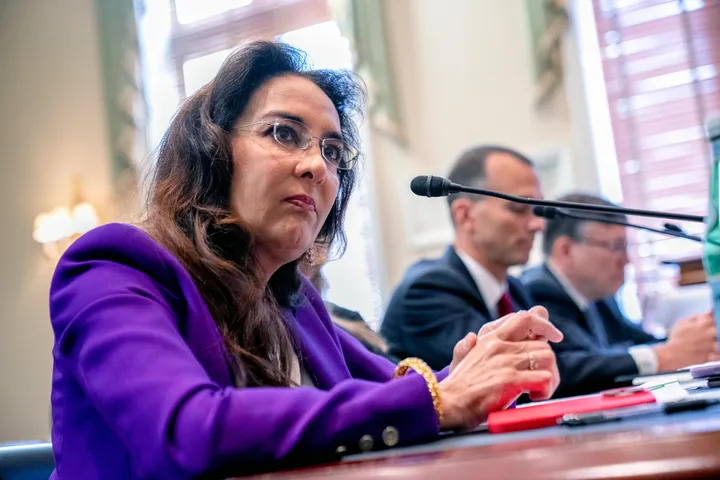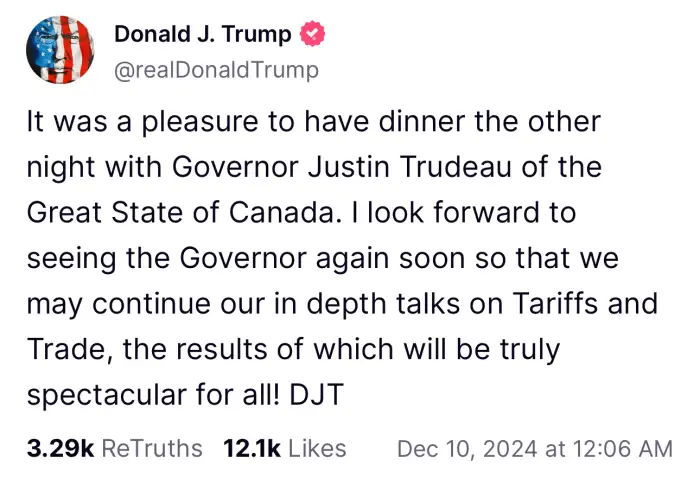News
No, Trump Can’t Just ‘Dismiss’ the Senate

The threat from House Republicans should be seen and called out for what it is: an autocratic move that is not just unlawful but contemptuous of constitutionalism.By Akhil Reed Amar, Josh Chafetz, and Thomas P. Schmidt
Donald Trump has not even returned to office, and already a constitutional crisis may be in the making. Trump has started announcing the people he intends to nominate for positions in his new administration. That is his prerogative. Several senators have criticized some of Trump’s choices. That is their prerogative (and two Trump nominees have already withdrawn under pressure). But rumors have been circulating of a plan to have Trump dismiss the Senate altogether, in a desperate effort to jam his nominees into office. There is simply no way to do this consistent with the text, history, and structure of the Constitution.
The Constitution and laws require the Senate’s approval to fill many of the government’s most important offices—such as attorney general or secretary of state—all of which wield extraordinary powers on behalf of the public. The Senate’s involvement helps to ensure that the people in these jobs have the necessary competence and integrity. In Alexander Hamilton’s apt words, the Senate can prevent the appointment of “unfit characters” who would be no more than “obsequious instruments” of the president’s “pleasure.”
The Senate’s check on the president can of course lead to friction and frustration at the start of an administration, while a new president’s nominees are considered and sometimes even rejected by the Senate. Advice and consent takes time. But as Justice Louis Brandeis famously observed, checks and balances exist “not to promote efficiency but to preclude the exercise of arbitrary power.” The purpose of the Constitution “is not to avoid friction” but “to save the people from autocracy.”
That is why any effort to cut the Senate out of the appointments process would be troubling; it is disdainful of self-government under a Constitution altogether. Trump’s supporters have suggested two ways to get around the Senate’s advice-and-consent process. In the first, the Senate would vote to go into recess soon after Trump’s inauguration, allowing him to unilaterally make a series of “recess” appointments. That plan may formally be legal, but it is plainly improper. The president is authorized to make recess appointments to “ensure the continued functioning of the Federal Government when the Senate is away,” as Justice Stephen Breyer wrote for the Supreme Court in 2014. That mechanism was vital in an age when the Senate was frequently absent from the capital for months at a time and could not quickly and easily reconvene. But, as Breyer also noted, the Constitution does not give “the President the authority routinely to avoid the need for Senate confirmation.” For the Senate to go into recess at the beginning of a new administration for the sole purpose of allowing the president to fill up the government with whomever he pleases—all while the Senate is controlled by the president’s party and perfectly capable of considering his nominees—would be a clear misuse of the recess-appointment power. Happily, the new Senate seems to agree, balking at Trump’s request that it surrender its prerogative so meekly.
As a result, some House Republicans have begun to discuss a more extreme scheme, one Trump considered during his first term: Trump could instead send the Senate home against its will and fill the government during the resulting “recess.” This is flagrantly unlawful.
How, one might ask, would such a plan even work? After all, the president, unlike an absolute monarch, does not have the power to dismiss Congress whenever he wants. Three of the first six “abuses and usurpations” charged in the Declaration of Independence related to King George III’s treatment of legislatures: He had “dissolved Representative Houses repeatedly,” he had refused to hold elections after these “dissolutions,” and he had “called together legislative bodies” at “distant” and “uncomfortable” places. The Framers were careful not to entrust the new office of president with such potent tools of “tyranny.” Instead, the president was given the power to “adjourn” the houses of Congress in only one narrow circumstance: “in Case of Disagreement between them, with Respect to the Time of Adjournment.” This power is so limited that it has never been used in all of American history.
The House Republicans’ idea seems to be to manufacture a “disagreement” to trigger this adjournment power. First, the House of Representatives would pass a resolution calling for a recess. The Senate would then (in all likelihood) refuse to pass the resolution. Trump would then declare the houses to be in “disagreement” and adjourn both houses for as long as he likes. From there, he would start his recess-appointments spree. There is just one glaring problem: The “disagreement” in this scenario is illusory.
Under the Constitution, each house can generally decide for itself how long it will sit. As Thomas Jefferson, an expert on legislative procedure, wrote in 1790: “Each house of Congress possesses [the] natural right of governing itself, and consequently of fixing it’s [sic] own times and places of meeting.”
The Constitution limits this autonomy in one key way: “Neither House, during the Session of Congress, shall, without the Consent of the other, adjourn for more than three days, nor to any other Place than that in which the two Houses shall be sitting.” In other words, if one house of Congress wants to leave in the middle of a session, it has to get the permission of the other house. The House of Representatives can’t just skip town if the Senate thinks important legislative business remains. But note that this provision limits each house’s power to “adjourn,” and not each house’s power to remain “sitting.” Neither house needs the agreement of the other to stay in session. If the Senate wants to let the House of Representatives leave while it considers appointments or treaties, that is perfectly fine. Indeed, there are plenty of examples of one house giving the other permission to go home. Under Article I, then, each house requires consent of the other to quit, but not to sit.
News
Trump Nominates Conservative Lawyer Harmeet Dhillon To Lead DOJ Civil Rights Division

Harmeet Dhillon was chosen by the president-elect to replace Kristen Clarke on the Justice Department’s civil rights efforts.
President-elect Donald Trump announced on Monday that he plans to nominate a conservative California attorney to lead a critical division of the Department of Justice.
Harmeet Dhillon, a former vice chairwoman of the California GOP and a national committeewoman for the Republican National Committee, was selected by Trump to serve as assistant attorney general for civil rights at the Justice Department. She would replace Kristen Clarke, who became the first woman and first Black woman to run the division in 2021.
Trump, who described Dhillon as one of the “top Election lawyers” in the country in his Truth Social announcement, said that she would have a large role in voting rights enforcement.
“Throughout her career, Harmeet has stood up consistently to protect our cherished Civil Liberties, including taking on Big Tech for censoring our Free Speech, representing Christians who were prevented from praying together during COVID, and suing corporations who use woke policies to discriminate against their workers,” he wrote.
Dhillon combated stay-at-home orders during the COVID-19 pandemic. She filed several lawsuits against government-level regulations, arguing there was overreach. The lawsuits Dhillon filed came after Democratic California Gov. Gavin Newsom became the first governor to issue statewide stay-at-home orders to shut down nonessential activities and interests to combat the spread of the coronavirus.
In 2018, Dhillon founded the conservative nonprofit The Center for American Liberty, which has filed lawsuits challenging vaccine requirements and trans-inclusive school policies. Most notably, Dhillon currently represents Chloe Cole, a young activist who sued Kaiser Permanente in California after she detransitioned from male to female. Cole has rallied alongside Republican politicians and conservative media figures, and has testified in support of dozens of state laws restricting access to gender-affirming care for trans youth.
Dhillon is highly critical of blue states that aim to uphold and protect rights for transgender people in light of ongoing legislative attacks. She said Maine’s “shield” law, which protects reproductive health care providers and trans people, is “unconstitutional” and expressed concerns about future protections in California.
A staunch opponent of abortion herself, the attorney also unsuccessfully represented anti-abortion activist David Daleiden, who in 2016 used a fake driver’s license to pose as a biomedical company executive and tried to buy fetal tissue from Planned Parenthood, in an effort to accuse the health care provider of selling tissue for profit.
Dhillon, who was born in India and is a practicing Sikh, has faced pushback from fellow Republicans due to questions of her faith. After she announced in 2022 that she would challenge RNC Chair Ronna McDaniel for her position, several members of the RNC circulated a video of Dhillon opening a 2016 Republican National Convention with a Sikh prayer. In a letter to Alabama Republicans in 2023 responding to the incident, Dhillon addressed concerns about her faith and slammed McDaniel’s leadership. Alabama Republican Chris Horn questioned how Dhillon’s religion would impact policy to NBC. McDaniel condemned attacks on religion but told Politico her allies questioned how Dhillon’s faith would impact the party.
Last year, former Fox News host and conservative political commentator Tucker Carlson hired Dhillon to represent him in a gender discrimination lawsuit by his former producer, Abby Grossberg. The ensuing settlement resulted in Fox paying Grossberg $12 million.
“I’m extremely honored by President Trump’s nomination to assist with our nation’s civil rights agenda,” Dhillon said in a post on X (formerly known as Twitter). “It has been my dream to be able to serve our great country, and I am so excited to be part of an incredible team of lawyers led by @PamBondi. I cannot wait to get to work!”
News
Trump’s Utterly Absurd Take On Birthright Citizenship Involves Walking Infants

The president-elect appeared very confused about how American citizenship is conferred.
In a freewheeling interview with NBC News Sunday, President-elect Donald Trump offered a head-scratching explanation for his plan to wage an attack on birthright citizenship.
“Did you know, if somebody sets a foot — just a foot, one foot, you don’t need two — on our land, congratulations, you are now a citizen of the United States of America,” Trump said, when discussing birthright citizenship.
“Yes, we’re going to end that, because it’s ridiculous,” he added.
Trump appeared to describe a hypothetical scenario in which a woman would give birth to an infant who — either capable of walking at birth or helped along by someone eager to win a bet — would set one foot on American soil and the other in either Mexico or Canada.
It is also possible Trump was imagining an infant hopping or standing on one leg. Neither scenario is plausible.
Trump also repeatedly asked whether the interviewer, Kristen Welker of “Meet the Press,” knew that the United States was the only country that conferred citizenship by birthright.
“We’re the only country that has it, you know,” Trump said. “You know we’re the only country that has it.”
Birthright citizenship is commonly recognized in the Americas, including in Canada and Mexico. Also known by its Latin legal term as “jus soli,” it is the concept of conferring citizenship by birth in a given country. Most countries instead recognize “jus sanguinis,” which instead confers citizenship based on the nationality of a person’s parents.
Welker did not challenge Trump’s utterly wrong description of how birthright citizenship works or that the United States is not alone in recognizing it. But she asked whether Trump intended to enact his proposed change through executive action.
“Well, if we can, through executive action,” Trump said. “I was going to do it through executive action, but then we had to fix COVID first, to be honest with you.”
Birthright citizenship is protected by the 14th Amendment to the Constitution. The president cannot use executive action to overturn a constitutional amendment, though legal experts expect the Trump administration to challenge the long-settled legal interpretation through the courts.
Trump has spent significant time in southern Florida, which is home to a large Cuban-American community.
He likely came up with this weird description of birthright citizenship by free-associating the issue with the now-defunct policy of allowing Cuban migrants to stay within the United States and pursue citizenship upon touching American soil. The policy was known as “wet-foot, dry-foot.”
During this year’s presidential campaign, Trump repeatedly described immigrants as coming from jails and mental institutions. He was likely resurrecting assertions he heard during the era of the Mariel boatlift four decades ago.
News
Trump Trolls Canadian Prime Minister Justin Trudeau, Stirs Controversy

Trump mocks the United States’ northern ally
In a post just after midnight on Truth Social, Trump took aim at Canadian Prime Minister Justin Trudeau with a mocking reference, calling him “Governor Justin Trudeau of the Great State of Canada.”

The comment, a throwback to Trump’s past suggestion that Canada might become the 51st U.S. state if they can’t handle his tariffs, is an insult to both Trudeau and Canada.

Trump recently posted an AI image of himself looking into Canada as if to annex it. Trump’s midnight post, claiming to look forward to future discussions on tariffs and trade with “Governor Trudeau,” further stoked tensions with a key ally and makes one question his diplomatic judgment.
Trump’s post undermines the United States’ relationship with Canada. Calling the Canadian leader a “Governor” belittles the sovereignty of a close neighbor and trading partner, and further feeds into the narrative of disrespect that Trump has often displayed toward foreign leaders.
The United States and Canada share deep economic, cultural, and geopolitical ties, and statements like this can jeopardize decades of cooperation. Trump is proving once again he will be an embarrassment to the United States.
-

 News11 months ago
News11 months agoGeraldo Rivera Slaps Trump Supporters With A Reality Check After Biden’s Pardon
-

 News11 months ago
News11 months agoBernie Sanders Flips The Script And Praises Trump Picks
-

 Uncategorized11 months ago
Uncategorized11 months agoNaked RFK Jr. Makes Cameo On Wife Cheryl Hines’ Social Media
-

 News11 months ago
News11 months agoPhoto of person of interest with the mask down was the “money shot,” police commissioner says
-

 News11 months ago
News11 months ago‘Banana Republic Stuff’: Mehdi Hasan Nails GOP Hypocrisy Over Trump’s Latest Move
-

 News11 months ago
News11 months agoBREAKING: Canada just stunned Trump with brutal news after holding an “emergency meeting.” This WON’T end well for Trump…
-

 News11 months ago
News11 months agoAnn Coulter Slams Controversial Trump Cabinet Nominee As ‘Sleazy’ Serial Adulterer
-

 News11 months ago
News11 months agoTrump Is Using “Unitary Executive” Theory in His Bid to Amass Supreme Power






